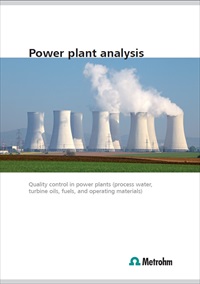Channels
Special Offers & Promotions
New Practical Guide to Chemical Analysis in Power Plants
Metrohm is pleased to present 'Power plant analysis', a practical guide to quality control in power plants.
 While the major focus is on water chemistry, the new brochure also presents methods for quality control of turbine oils, fuels, and operating materials. «Power plant analysis» spans the entire array of types of thermal power plants dealing with fossil-fueled plants and nuclear plants (BWR, PWR) alike.
While the major focus is on water chemistry, the new brochure also presents methods for quality control of turbine oils, fuels, and operating materials. «Power plant analysis» spans the entire array of types of thermal power plants dealing with fossil-fueled plants and nuclear plants (BWR, PWR) alike.
All thermal power plants use water as a central (operating) medium. As a liquid, it is used for cooling and as a gas, it drives the turbines. In nuclear power plants, it also moderates the fission neutrons and thus controls nuclear fission. A well-devised water chemistry ensures safe and efficient power plant operation.
This what the new Metrohm brochure helps to ensure, as it gives answers to crucial questions such as:
- Which methods to use for corrosion monitoring in process waters?
- How to monitor crucial parameters in cooling water?
- How to control the quality of boiler feed (ultrapure) water?
- How to determine constituents (boric acid, lithium, nickel, zinc, calcium, magnesium) in the primary circuit of a PWR?
- How to manage and control corrosion inhibitors (e.g., hydrazine) and conditioning agents?
“Power plant analysis” differentiates between process parameters and laboratory parameters, presenting solutions for both. Particular emphasis is put on corrosion as a major, almost ubiquitous threat to the performance of any type of thermal power plant. Here, the brochure gives an overview of the relevant norms and methods (ISO, ASTM, EN, DIN)
Brief chapters on waste water monitoring, flue gas cleaning, turbine and lubricating oils, as well as quality control of fuels and operating materials make “Power plant analysis” a very handy reference for anyone involved in quality control in power plants.
download the new brochure free of charge
Media Partners


